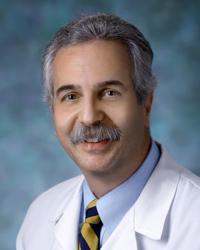Research Lab Results
-
Ken Witwer Laboratory
The Ken Witwer Laboratory investigates extracellular vesicles and RNA in the context of HIV infection and inflammatory disease. We are also actively assessing the effects of diet on extracellular RNA as a potential therapeutic approach.
-
Florin Selaru Lab
Research interests in the Florin Selaru Lab comprise the molecular changes associated with the transition from inflammatory states in the GI tract (colon, stomach, biliary tree) to frank cancers. In addition, our current research—funded by the AGA, FAMRI and the Broad Foundation—works to further the understanding of cancer development and progression in the gastrointestinal tract.
-
The Hackam Lab for Pediatric Surgical, Translational and Regenerative Medicine
David Hackam’s laboratory focuses on necrotizing enterocolitis (NEC), a devastating disease of premature infants and the leading cause of death and disability from gastrointestinal disease in newborns. The disease strikes acutely and without warning, causing sudden death of the small and large intestines. In severe cases, tiny patients with the disease are either dying or dead from overwhelming sepsis within 24 hours. Surgical treatment to remove most of the affected gut results in lifelong short gut (short bowel) syndrome. The Hackam Lab has identified a critical role for the innate immune receptor toll-like receptor 4 (TLR4) in the pathogenesis of necrotizing enterocolitis. The lab has shown that TLR4 regulates the development of the disease by tipping the balance between injury and repair in the stressed intestine of the premature infant. Developing an Artificial Intestine A key goal is to create, in the laboratory, new intestines made from patients’ own cells, which can then be implanted into the patient to restore normal digestive function. This innovative design could transform child development and quality of life in necrotizing enterocolitis survivors without the risks of conventional donor transplant. -
Michael Caterina Lab
The Caterina lab is focused on dissecting mechanisms underlying acute and chronic pain sensation. We use a wide range of approaches, including mouse genetics, imaging, electrophysiology, behavior, cell culture, biochemistry and neuroanatomy to tease apart the molecular and cellular contributors to pathological pain sensation. A few of the current projects in the lab focus on defining the roles of specific subpopulations of neuronal and non-neuronal cells to pain sensation, defining the role of RNA binding proteins in the development and maintenance of neuropathic pain, and understanding how rare skin diseases known as palmoplantar keratodermas lead to severe pain in the hands and feet.
-
Philip Smith Lab
Work in the Philip Smith Lab explores several key topics within the field of sleep medicine. We investigate the role of obesity and neural control in sleep-disordered breathing as well as the impact of metabolic function on sleep apnea. We also research the ways in which HIV and its treatments impact a patient’s sleep. Our studies have included the effects of HIV and highly active antiretroviral therapy (HAART) on both sleep and daytime function as well as the relationship between systemic inflammation and sleep apnea in men with HIV.
-
Andrew Lane Lab
The Lane laboratory is focused on understanding molecular mechanisms underlying chronic rhinosinusitis, particularly the pathogenesis of nasal polyps, as well as inflammation on the olfactory epithelium. Diverse techniques in molecular biology, immunology, and physiology are utilized to study epithelial cell innate immunity, olfactory loss, and response to viral infection. Ongoing work explores how epithelial cells of the sinuses and olfactory mucosa participate in the immune response and contribute to chronic inflammation. The lab creates and employs transgenic mouse models of chronic nasal/sinus inflammation to support research in this area. Collaborations are in place with the School of Public Health to explore mechanisms of anti-viral immunity in influenza and COVID-19.
-
Chirag Parikh Lab
Dr. Parikh's research focuses on the translation and validation of novel biomarkers for the diagnosis and prognosis of acute kidney injury. Progress in kidney diseases has been hamstrung by significant heterogeneity within the current disease definitions, which are largely based on serum creatinine. Dr. Parikh's research has addressed this critical challenge by developing biomarkers of renal tubular injury, repair, and inflammation to dissect this heterogeneity. He has assembled multicenter longitudinal prospective cohorts for translational research studies across several clinical settings of acute kidney injury and chronic kidney disease for the efficient translation of novel biomarkers.
His research is dedicated to the process of applying discoveries generated in the laboratory and in preclinical experiments, the development of clinical studies, and the design of clinical trials. Dr. Parikh's studies have refined the clinical definition in perioperative acute kidney injury and hepatorenal syndrome, developed strategies to reduce kidney discard in deceased donor transplantation, and advanced regulatory approvals of kidney injury biomarkers. He has also developed biomarkers to identify rapid progressors of early diabetic kidney disease before derangements in serum creatinine. Dr. Parikh's research goal is to translate our understanding of pathophysiological mechanisms into clinical practice and improve the outcomes in patients with kidney disease.
Dr. Parikh has also been the recipient of numerous honors, including the 2017 Young Investigator Award from the American Society of Nephrology. -
Zaver M. Bhujwalla Lab – Cancer Imaging Research
Dr. Bhujwalla’s lab promotes preclinical and clinical multimodal imaging applications to understand and effectively treat cancer. The lab’s work is dedicated to the applications of molecular imaging to understand cancer and the tumor environment. Significant research contributions include 1) developing ‘theranostic agents’ for image-guided targeting of cancer, including effective delivery of siRNA in combination with a prodrug enzyme 2) understanding the role of inflammation and cyclooxygenase-2 (COX-2) in cancer using molecular and functional imaging 3) developing noninvasive imaging techniques to detect COX-2 expressing in tumors 4) understanding the role of hypoxia and choline pathways to reduce the stem-like breast cancer cell burden in tumors 5) using molecular and functional imaging to understand the role of the tumor microenvironment including the extracellular matrix, hypoxia, vascularization, and choline phospholipid metabolism in prostate and breast cancer invasion and metastasis, with the ultimate goal of preventing cancer metastasis and 6) molecular and functional imaging characterization of cancer-induced cachexia to understand the cachexia-cascade and identify novel targets in the treatment of this condition. -
William G. Nelson Laboratory
Normal and neoplastic cells respond to genome integrity threats in a variety of different ways. Furthermore, the nature of these responses are critical both for cancer pathogenesis and for cancer treatment. DNA damaging agents activate several signal transduction pathways in damaged cells which trigger cell fate decisions such as proliferation, genomic repair, differentiation, and cell death. For normal cells, failure of a DNA damaging agent (i.e., a carcinogen) to activate processes culminating in DNA repair or in cell death might promote neoplastic transformation. For cancer cells, failure of a DNA damaging agent (i.e., an antineoplastic drug) to promote differentiation or cell death might undermine cancer treatment. Our laboratory has discovered the most common known somatic genome alteration in human prostatic carcinoma cells. The DNA lesion, hypermethylation of deoxycytidine nucleotides in the promoter of a carcinogen-defense enzyme gene, appears to result in inactivation of the gene and a resultant increased vulnerability of prostatic cells to carcinogens. Studies underway in the laboratory have been directed at characterizing the genomic abnormality further, and at developing methods to restore expression of epigenetically silenced genes and/or to augment expression of other carcinogen-defense enzymes in prostate cells as prostate cancer prevention strategies. Another major interest pursued in the laboratory is the role of chronic or recurrent inflammation as a cause of prostate cancer. Genetic studies of familial prostate cancer have identified defects in genes regulating host inflammatory responses to infections. A newly described prostate lesion, proliferative inflammatory atrophy (PIA), appears to be an early prostate cancer precursor. Current experimental approaches feature induction of chronic prostate inflammation in laboratory mice and rats, and monitoring the consequences on the development of PIA and prostate cancer.
-
Vascular Neurology Lab
Vascular research led by Rafael Tamargo, M.D., the Walter E. Dandy Professor of Neurosurgery, explores treatment of aneurysms, arteriovenous malformations, cavernous malformations, and arteriovenous fistulas of the brain and spinal cord. Basic science research has focused on endothelial cell-leukocyte interactions (inflammation) after subarachnoid hemorrhage and identifying drugs that might inhibit this inflammatory response as well as the narrowing of blood vessels.



